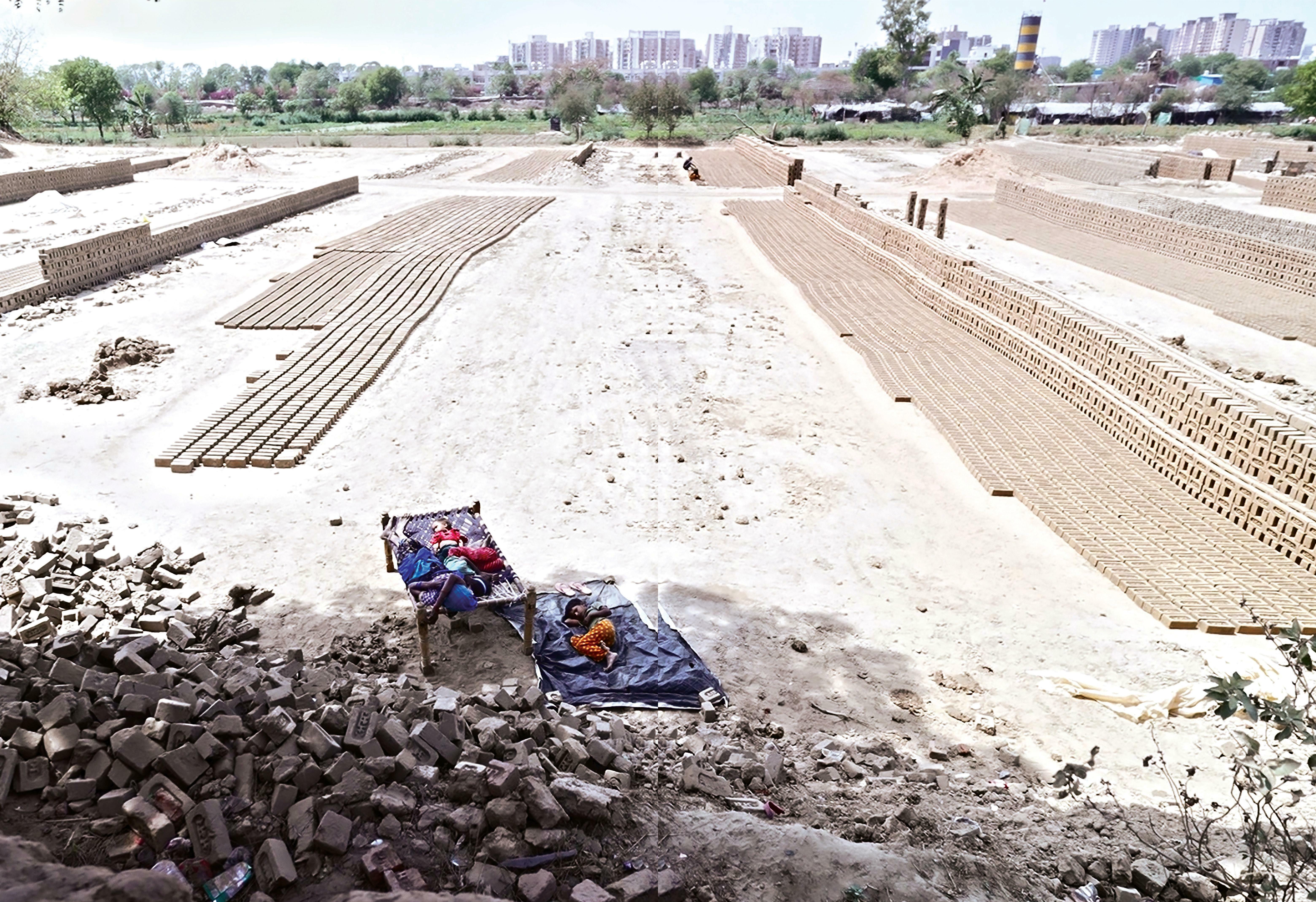Prøve GULL - Gratis
BLAZING SUN IS ON
Down To Earth
|May 01, 2024
Rising temperatures are testing the limits of human tolerance to heat. With their predominantly built-up landscape, urban areas offer no respite. A study by the Centre for Science and Environment on the morphology and heat patterns of nine Indian cities over the past decade shows how these urban centres are turning into heat islands with a potentially serious impact on human health. An analysis by Rajneesh Sareen, Mitashi Singh and Nimish Gupta, with Shagun in Haryana and Kiran Pandey

BIRESH KUMAR, a 38-year-old labourer, works at least six hours in the sun every day. Though it is only mid-April-early days of summer in north India-the afternoon temperatures hover around 38°C in Bhopani, the village in Haryana's Faridabad district where Kumar works at a brick kiln. When the summer peaks in May-June, the mercury will likely cross 40°C. "I feel like I'm trapped in a heat island. But I have to work to repay a debt I owe to the labour contractor," says Kumar.
Sitting on a cot under a tree at some distance is Kumar's co-worker Somveer. For the past two days, Somveer has had body ache, weakness and fever, which have forced him to miss work and, as a result, forego his wage. He does not know the reason for his condition, but says it could be due to constantly working under the sun. The National Institute for Occupational Safety and Health, US, recommends that those who work in the heat should consume 237 ml of water every 15-20 minutes. But for workers like Kumar and Somveer, that would mean more breaks and missed targets, resulting in a loss of wage. Neeraj Kaushik, medical officer in-charge at the government hospital in Kheri Kalan that Somveer and Biresh have access to, says he sees several labourers with complaints of fainting episodes. "They are weak and dehydrated, with severely chapped lips. If they have comorbidities, like diabetes, it becomes an emergency situation. If their vitals are weak, it takes a long time to resuscitate them," he says.

Denne historien er fra May 01, 2024-utgaven av Down To Earth.
Abonner på Magzter GOLD for å få tilgang til tusenvis av kuraterte premiumhistorier og over 9000 magasiner og aviser.
Allerede abonnent? Logg på
FLERE HISTORIER FRA Down To Earth

Down To Earth
THINK TWICE BEFORE FELLING SAL TREES
Many trees considered to be affected by sal borer in the 1990s are still alive today
1 mins
February 16, 2026

Down To Earth
EDGE OF SURVIVAL
Caste divides deny marginalised communities land, resources and essential aid, leaving them more vulnerable to climate disasters
6 mins
February 16, 2026

Down To Earth
A WISH LIST?
Union Budget for 2026-27 conveys the impression of a roll-call of intentions and ambitious proposals, with little detail on their formulation
6 mins
February 16, 2026
Down To Earth
Break down the gender wall
THE RULING National Democratic Alliance (NDA) government has been heavily invested in the goal to make India a developed economy by 2047.
2 mins
February 16, 2026

Down To Earth
MENSTRUAL HEALTH, NOW A FUNDAMENTAL RIGHT
In a landmark judgement, the Supreme Court has recognised menstrual health and hygiene as a fundamental right under Article 21 of the Constitution of India, which guarantees the right to life and dignity.
8 mins
February 16, 2026

Down To Earth
Of devolution and new disasters
The 16th Finance Commission pushes for changes in view of new fiscal and climatic conditions
11 mins
February 16, 2026
Down To Earth
Rising risks of plastics
NEGATIVE IMPACTS on human health due to emissions linked to the plastic lifecycle could double by 2040, according to a study published in The Lancet Planetary Health in January.
1 min
February 16, 2026

Down To Earth
GAP BETWEEN EPIDEMICS NARROWING
A watershed-based and landscape-level approach is needed to address forest degradation
2 mins
February 16, 2026

Down To Earth
WAITING TO STRIKE
Sal heartwood borer is considered the biggest threat to forestry in India, especially to the sal tree, where it lives and breeds.
11 mins
February 16, 2026

Down To Earth
A SPRING DELIGHT
Mustard flowers are not meant only for the eyes. Invite them to your plate once in a while
3 mins
February 16, 2026
Listen
Translate
Change font size

